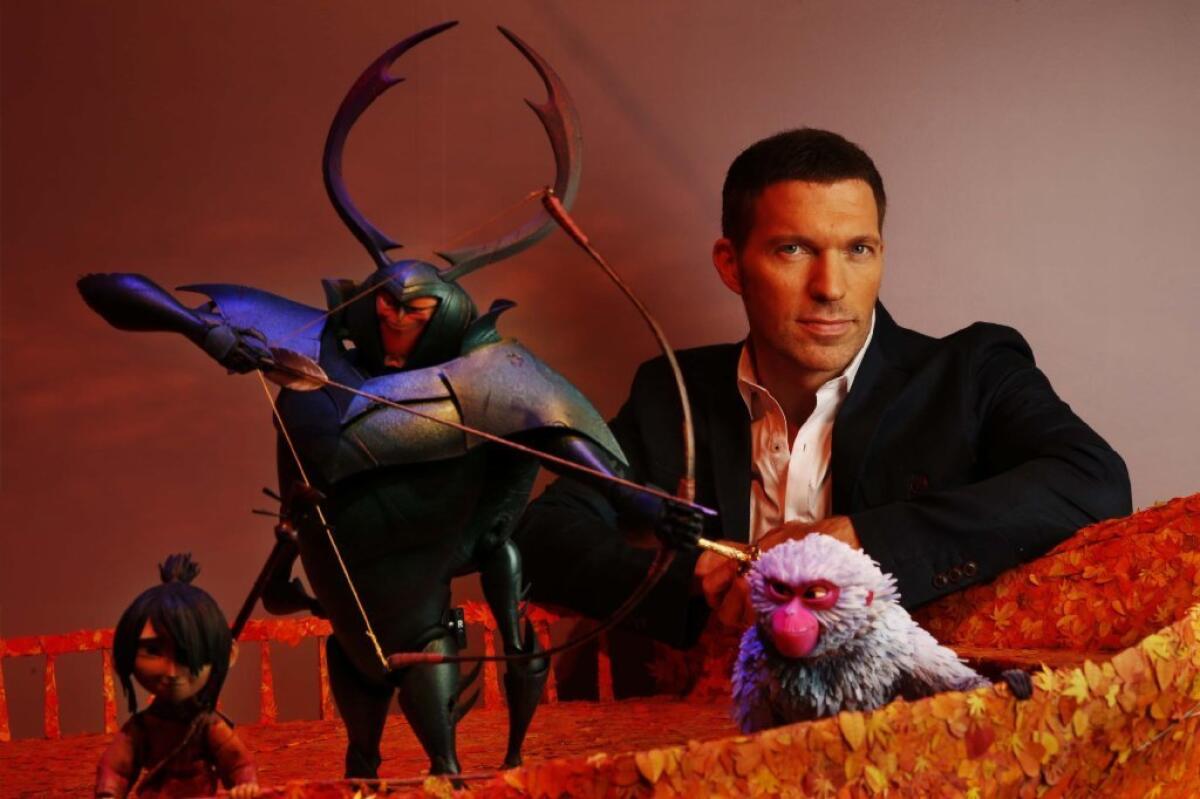‘Kubo’ tackles deep issues — death, loss, healing — within its dream-like tale

- Share via
“Kubo and the Two Strings,” from upstart American animation studio Laika, confounds expectations on its way to Oscar contention. The gorgeously handcrafted stop-motion film seems to embark on that familiar hero’s journey, only to find its own way home.
“As we structured the thing, we were definitely well aware of the ground we were treading on, the formulas, the templates, the classics of the genre,” says “Kubo” director and Laika Entertainment chief Travis Knight. “But while ‘Kubo’ is in that tradition, it takes a different path when it gets to the end.”
The film looks different as well, with its character models and environments inspired by Japanese folklore. It’s not a sequel, it’s not based on specific myths or books; it just feels like it is rooted deeply somewhere. And unlike some current entertainments, it even allows its characters to stay Asian – albeit voiced by Caucasian actors in the lead roles. Strange.

The trailer for “Kubo and the Two Strings.”
The titular boy magically animates his origami creations to tell stories in the remote Japanese village where he lives with his reclusive mother. When malevolent spirits from the family’s past finally find them, Kubo is set on a quest that seems martial but turns out to be spiritual.
Knight says, “I – and many of the artists on this show – found so much of ourselves in this boy. Effectively, he’s an artist, he’s a storyteller, he’s a musician, he’s an animator, really, when you think of how he brings these inert objects to life.”
Kubo (voiced by Art Parkinson) is aided by a monkey totem brought to life (Charlize Theron) and what can only be called a “beetle samurai” (Matthew McConaughey). The perils might be a bit darker than in most animated fare and the denouement might not be what is expected, but that’s appropriate for a film that wades into some deep waters.
Life is a struggle and it has a cost. These are not things you typically explore in an animated film, but it’s a fundamental part of what it means to be.”
— Travis Knight
“We get into notions of death and loss. But we also explore what comes out on the other side of that – healing, forgiveness, empathy,” says Knight. “The people that we love are often ripped away from us. Life is a struggle and it has a cost. These are not things you typically explore in an animated film, but it’s a fundamental part of what it means to be. As someone who has lost many loved ones – I lost my brother about a decade ago – there are so many different things you experience when you go through a heavy loss like that and we try to put them in this film. This boy, he comes to a pretty wide reconciliation with those issues in 90 minutes. It took me a good five or six years.”
That’s not to paint “Kubo” as some grim exercise in pain. McConaughey, in particular, earns goodwill and laughs with his earnest vocal performance and Theron’s monkey character is afforded remarkably specific expression by talented stop-motion craftspeople.
“These puppets are nine or 10 inches tall and they’re shot on these gussied-up tabletops in the middle of this crummy warehouse,” says Knight. “The behavior needs to be so well observed and so keenly felt, we just put a lot of care into the facial performances, the physical performances, so these creatures felt alive, not an assemblage of silicon and steel and cloth – living, breathing things with hopes and dreams and aspirations.”

Travis Knight discusses how the stop-motion fantasy “Kubo and the Two Strings” came to be.
“Kubo” was rapturously received by critics (97% on Rotten Tomatoes) but grossed just $68.7 million. If it were to win the Oscar, it would be the lowest-grossing honoree ever – by about 66%. That bit of uniqueness would be right in line with a non-trend-chasing film that seems to occupy a space that’s both fable and dream.
Knight says, “The fact that it feels like a dream is absolutely intentional. What’s real, what isn’t, what’s imagined? Is Kubo a reliable narrator? By taking the events in the film – which are fairly heavy when you get down to what this kid goes through – and making it more of an abstraction, we can explore important issues that are removed enough from real life that they can take the sting out of it, but hopefully offer the same insight.
“But the idea that our experiences with our family, their lessons, their wisdom, their love – they can be enduring wellsprings of strength and solace and guidance in our lives … even if they’re not physically with us anymore, we can carry them with us in a different way. That’s a source of great comfort for me, and I hope for others as well.”
See the most read stories this hour »
ALSO:
Animated films draw on all aspects of life
Oscar predictions for animated feature, song and score -- with a nod to a possible EGOT addition
‘Zootopia’ and ‘Kubo’ lead Annie Awards nominations
Lin-Manuel Miranda navigates the Pacific to help send ‘Moana’ on a daring adventure
More to Read
Sign up for The Envelope
Get exclusive awards season news, in-depth interviews and columnist Glenn Whipp’s must-read analysis straight to your inbox.
You may occasionally receive promotional content from the Los Angeles Times.




